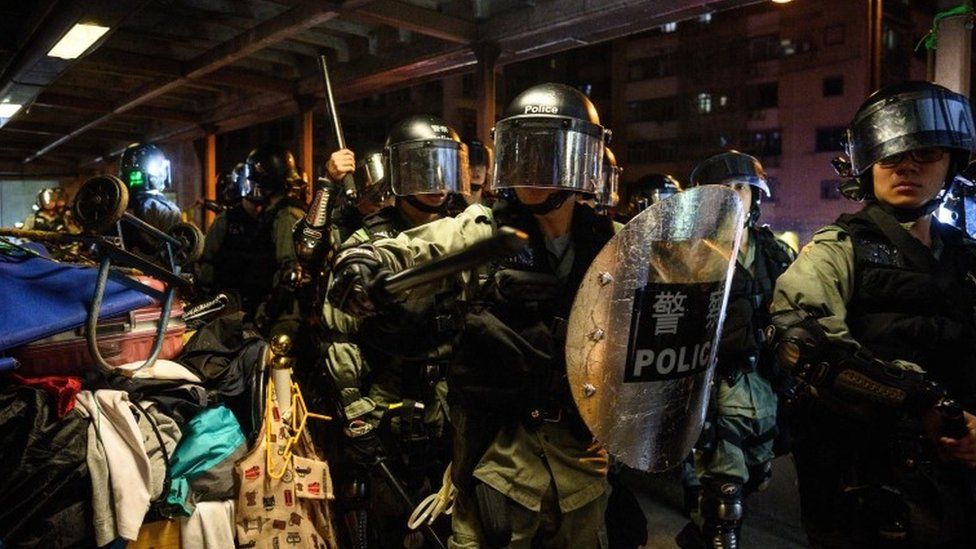Hong Kong police 'pushed to the limit'
- Published

Hong Kong's police force is at the limits of its capacity as it struggles to contain the fallout from a political crisis now more than three months old.
This frank analysis was given by a very senior police officer in an off the record briefing to international journalists, including the BBC's Stephen McDonell.
A month ago Hong Kong's police were confident they had the situation in their city under control.
They had changed tactics, felt they had protesters on the run and said this meant there would be no need for Beijing's intervention.
However now they are being pushed to the limit of what they can achieve with the resources they have.
The protest movement has shifted, bringing extreme challenges for those in charge.
Initially there were peaceful marches opposing a plan to allow for extradition to mainland Chinese courts.
Then came running street battles between riot police and black clad protesters demanding universal suffrage and an independent inquiry into allegations of police collusion with organised crime, something the police have consistently opposed.
More on the Hong Kong protests:
- Summary of the protests in 100 or 500 words
- All the context you need on the protests
- Timeline of events so far
- How is Hong Kong run? and what is the Basic Law?
- The background to the protests in video
- A visual guide to how one peaceful protest turned violent
In a briefing lasting more than three hours at police headquarters a senior officer told a small group of reporters: "If it escalated any more we would be eating into other areas of policing. We're at the limit but managing it."
He said recruitment had fallen significantly in June and July as protests escalated and the authorities were criticised for what was seen as a heavy-handed response but that numbers had bounced back in August.
He said he had told front-line officers to maintain morale because only their agency was able to save this city from chaos and destruction.
"I try to convince officers that we are the only people who can protect Hong Kong at this juncture".
Quick guide to HK protests
- The Hong Kong protesters are mostly young people worried about their future. Their demands have now expanded to include genuine universal suffrage and an inquiry into police behaviour
- The protests started off peaceful but as the weeks have worn on the violence has escalated. The alleged involvement of gangs and undercover cops has led to fear, mistrust and suspicion
- Hong Kong is part of China, but enjoys "special freedoms". Those are set to expire in 2047, and many in Hong Kong don't want to become "another Chinese city"
Asked about an Amnesty International report accusing police of torture, arbitrary arrests and other abuses, the senior officer said the claims were totally unfounded, that the report was based on anonymous sources and Amnesty should have come to them with any complaints they had received,
However during the discussion on Friday he did acknowledge that "in any prolonged situation I'd be dishonest if I said that nobody has overstepped the line".
When it comes to allegations from the Chinese government that "foreign forces" were to blame for the ever more militant and destructive tactics being used by some demonstrators, he said local people were to blame but that a proposed bill in US Congress pegging trading status to Hong Kong's human rights performance would only encourage violence.
He blamed teachers for seeding the idea in students' minds that it was alright to break the law for a good cause.
100 days of protests in Hong Kong in 100 seconds
Polling in Hong Kong appears to show that the reputation of this once highly respected law enforcement institution has collapsed in recent months with regular scenes of police being surrounded by members of the public shouting abuse at them.
This officer said that most police were "baffled by the degree of animosity" against them and that "...any spare capacity we do have we are already looking ahead to after this crisis and how we mend relations with the community. These things are already in the pipeline… Have confidence in us. We are a really good police force."
He said the force, one of Asia's oldest, has benefited from 175 years of learning, including from their mistakes.
- Published28 November 2019
- Published17 September 2019
- Published17 September 2019
- Published17 August 2019